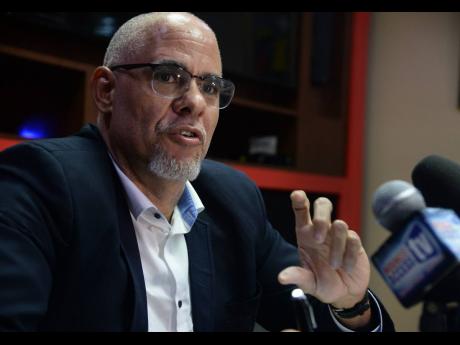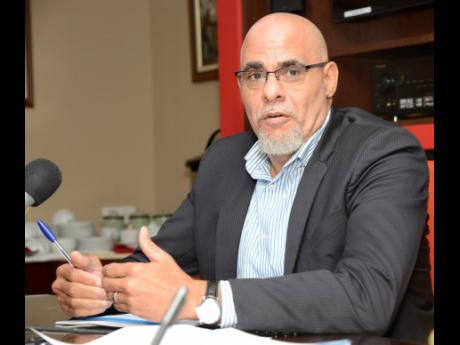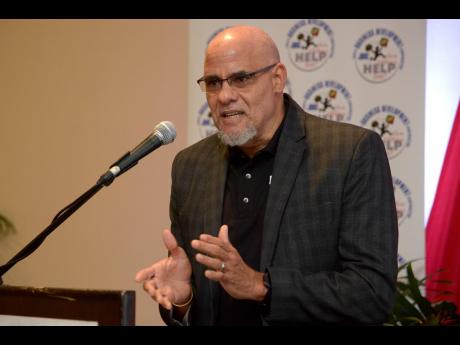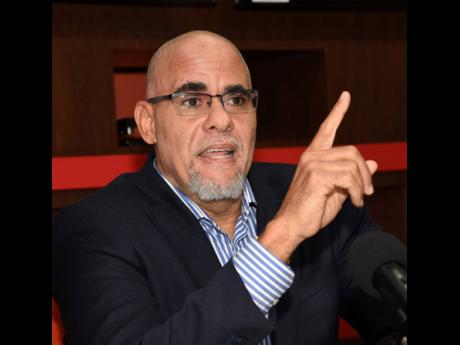Duncan: Ja has too much potential to lose hope
PSOJ president urges Gov’t to put crime, corruption, COVID in crosshairs
Although saddled with the seemingly unshakeable burdens of crime, corruption, under-education and a huge social deficit as it takes a blow from the COVID-19 pandemic, Keith Duncan believes there is hope for Jamaica lying in social transformation, which must be done surgically to inspire confidence and renew hope.
In an exclusive interview with The Sunday Gleaner last week, the distinguished business leader insisted that the country had too much potential for him to lose hope – not yet anyway, and maybe never, if radical steps are taken to bring about the transformation with the precision and speed required.
“About 552,000 unattached persons have not offered themselves for employment and are not contributing productively to society. Within this group are persons who could be more productively deployed. We must understand that this is where a big part of our challenge is and one of the root causes of crime,” said Duncan, who last week secured a historic third consecutive term as head of the Private Sector Organisation of Jamaica (PSOJ).
He bemoaned the fact that a large number of Jamaicans remain unskilled, uncertified, unemployed and underemployed.
“When you look at your workforce of two million, 767,000 have not offered themselves for employment. You are left with 1.3 million, Of that, 1.2 million, 63 per cent have no certification. What does say about us as a people?” he pondered.
The answer is simple, he said.
Jamaicans have not been adequately trained for the new digital economy, globalisation and automation, he noted, adding that many persons have also not been sufficiently equipped to move Jamaica forward. As such, programmes to foster human capital development are urgently needed as the education system has long underperformed, resulting in losses in labour productivity for the last two decades, Duncan noted.
He said the country was spending roughly the same as other region neighbours in education, but not getting sufficient value because of underinvestment at the early childhood level.
“Our foundation is weak, and every year we recycle them and they become untrainable. We are not configuring ourselves to win, and not making the right investment in our people and not getting the value for our spend. If we don't fix this, then crime is going to continue to rage on, and on, and on,” Duncan said, sadly.
Country not short on ideas
Duncan issued a challenge to the Government and the wider society.
“We have to invest in our marginalised. Marginalised depressed communities have not been the focus of our attention, and that is why we have crime. And we all, as a society, are responsible for this because we have allowed this to happen. It is the number one objective for the PSOJ in 2022,” he said.
“We believe the Government of Jamaica is listening now; we have the Consensus Monitoring Oversight Committee in place and one of their objectives is social transformation,” Duncan added, referencing a committee which comprises non-partisan stakeholders from the private sector, civil society, academia, and the political directorate established to look at the country's crime problem.
Jamaica is not short on ideas or workable initiatives, he told The Sunday Gleaner.
A cache of studies have been undertaken and myriad anti-crime recommendations placed on the table by different bodies over several years, yet murders and other violent crimes have largely trended upwards, except minor reductions for brief periods.
Consensus was secured around social transformation to support early intervention to divert offenders from crime, prosecution and custody; ensuring the enactment of effective laws and encouraging law and order; modernisation of law enforcement to deliver efficient services; conducting effective prosecutions; a reformed penal system; and a judiciary that administers justice with consistency and appropriateness.
“We are going to keep it on the front burner,” Duncan promised.
He noted that on the shin of crime is corruption.
“Corruption undermines everything and cause distrust in the society, in our leaders and the systems of government. An honest hard-working member who provides for his family and sees others getting ahead through corruption will not be inspired to continue. It leads to voter apathy as we have seen,” he said with a pained expression.
Noting a positive step in the Public Bodies Management Accountability Act passing through the Lower House, he encouraged senators to give it their full attention.
“There must be greater accountability and much better governance of the assets of the people of Jamaica. Corruption undermines the whole country and it cannot be allowed to continue. We have seen the dismissal of ministers by the prime minister. What we need are competent persons, in the first place, on boards – no political cronyism; people with the requisite skills needed,” Duncan urged.
He said it was “very good” for Jamaica that “individuals who sold their political contributions to parties will no longer get an automatic seat on any state board”.
Tackling the 'dragon'
The man who sits at the helm of the Jamaica Money Market Brokers (JMMB) Limited said that the country should make the same effort to curb crime and corruption as was done with the economic oversight.
Keith Duncan, the chairman of the Economic Programme Oversight Committee, noted that the Jamaican economy was “recovering nicely” and heading to pre-COVID performance levels in under two years. He described the progress as “excellent”.
“Jamaica now faces a complex set of macro-fiscal scenarios as it does a delicate balancing of living with COVID, along with the knock-on effects of inflation over the next year. This will require astute management from the Bank of Jamaica (BOJ) and the Ministry of Finance and the Public Service as Jamaica seeks to continue on its growth trajectory,” said Duncan.
“We are well on our way, though, as I think the country has the best person as finance minister right now. The kind of leadership that he has shown is what is required to navigate the challenges,” Duncan said, giving Finance Minister Dr Nigel Clarke a vote of confidence.
The PSOJ president, however, warned that inflation was still a “dragon” looming large.
“Currently, there is a dragon called inflation. Inflation expectations is currently through the roof in several countries of the world as a result of the continuing fallout of COVID. In the USA, it's the highest it has been for the last 40 years, at 6.8 per cent,” he noted.
If that comes through to Jamaica, the BOJ – with their mandate of keeping interest rates of between four and six per cent – will use monetary policy tools to slow down the economy and raise interest rates to deter Jamaicans from buying US dollars.
“The challenge will be to get them to keep their money in Jamaican dollars, but the BOJ says it will do everything to keep the dollar in check,” he sated.
Vaccine disappointment
On the issue of COVID, he expressed disappointment with the island's flagging vaccination drive with a significant percentage of Jamaicans yet to take the shots.
“I think we are clear that Jamaica's vaccination levels are not where they should be and those with a higher willingness to be vaccinated have done so. What is missing is what is happening within the communities where people live, that are a few bus stops away and they don't have the money to go and are not sufficiently motivated to go to a fixed site. You need to get close to the people and provide access,” he stated.
Private sector vaccine initiatives have been taken to inner-city communities such as Union Gardens, Riverton City and Majesty Gardens in the Corporate Area, using mobile, agile vaccination teams. A soft, non-confrontational approach is being taken, walking with public health nurses and doctors, who meet the residents at their own level and provide access and education. He is recommending a similar strategy for rural communities.
Other private sector-led initiatives have resulted in an average of 50 to 70 per cent vaccination in both formal and informal sectors.
Feedback at JMMB suggests a 70 to 75 per cent take-up, and although some staff are shying away as a result of hesitancy, Duncan said that efforts to woo them will continue.
Jamaica not a sinking boat
Despite all this, there is still much to fight for in Jamaica, Duncan believes.
“It is not a sinking boat. Jamaica is too beautiful a country and our people are too knowledgeable and resourceful to give up hope or to be selfish. It can't be just about me and my family. To whom much is given, much is expected, and I come from a background of service, where my father and my mother believed in our country,” he reminded.
“Jamaica is not far off from being a great country and we are manifesting our greatness in many ways. If we take the hard decisions now to invest in our people, in education and social transformation, we can turn this thing around. Even while we make other investments ... ,” he said confidently.
This includes high energy costs – which he labelled as being “too expensive”, but the largest single investment that must be made, the PSOJ president said, however, “is investment in the people”.
This, he added, could mean making tough choices between investing in people versus infrastructure.
“Inside of the marginalised communities, some of them don't have basic infrastructure. You need to give the love and respect to these communities, so that they can feel a part of society, or what you will have is less and less people voting, as we have seen already, because they do not believe this country works for them,” Duncan stated.
He wants the society to also become more proactive in holding leaders accountable, especially political leaders “when they take politically expedient actions, some of which are not in the best interest of the country but what is in the best interest of political power”.
He added: “It's being done way too often in Jamaica, and for years, but because you may lose political capital and it becomes politically expensive, it is not done for the long-term benefit and people lose hope. It becomes no longer about patriotism, but selling of votes. The vision must be clear for all to see,” he stated.
“So I am giving it (leadership and advocacy) my shot in the roles that I have been given. And this is not naturally a position that the PSOJ will take, but I believe we are a lot more open as a country, because we have seen that in the last 20 to 30 years, we are in a crime epidemic and you need to get to the root of the problem to solve it,” he promised.
“Everybody wants to live in this country because of the vision we have for it and because noweh nuh betta dan yaad. Every part of Vision 2030 can be done. All it requires is a national coordinated effort and leadership across the board. We did it for macroeconomic stability across the board. We must do it for human development and invest in our people,” he challenged.









